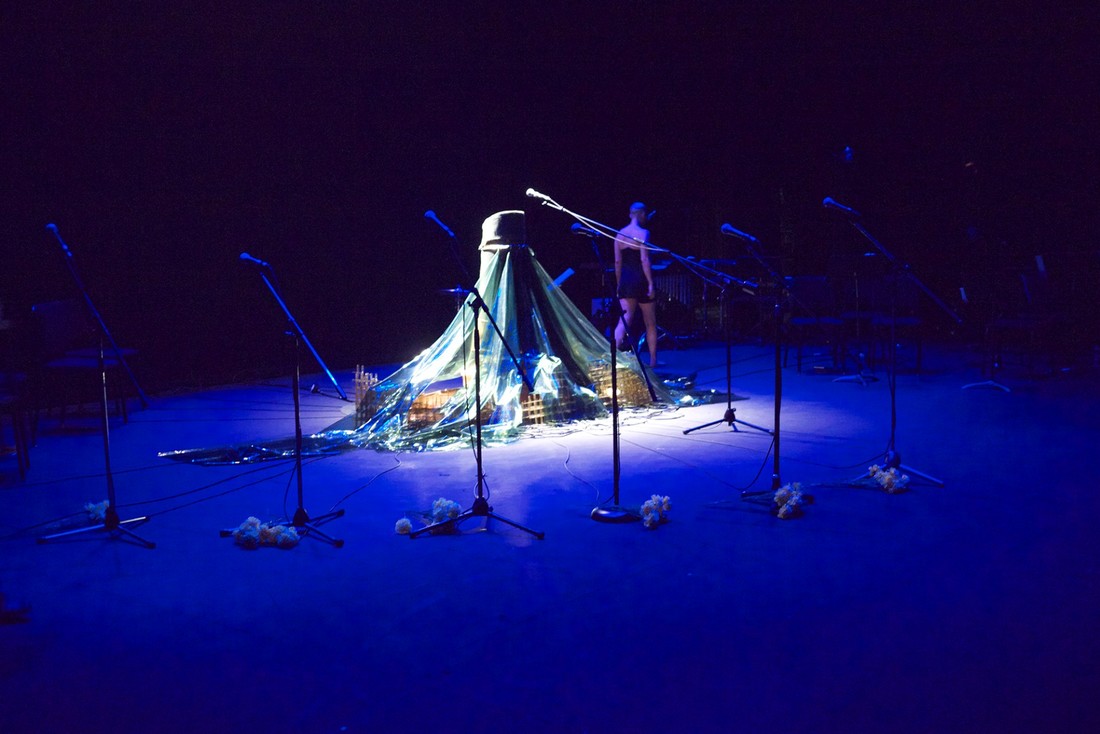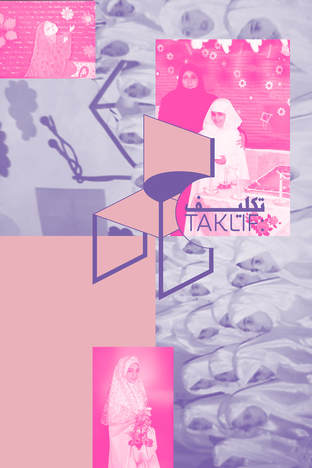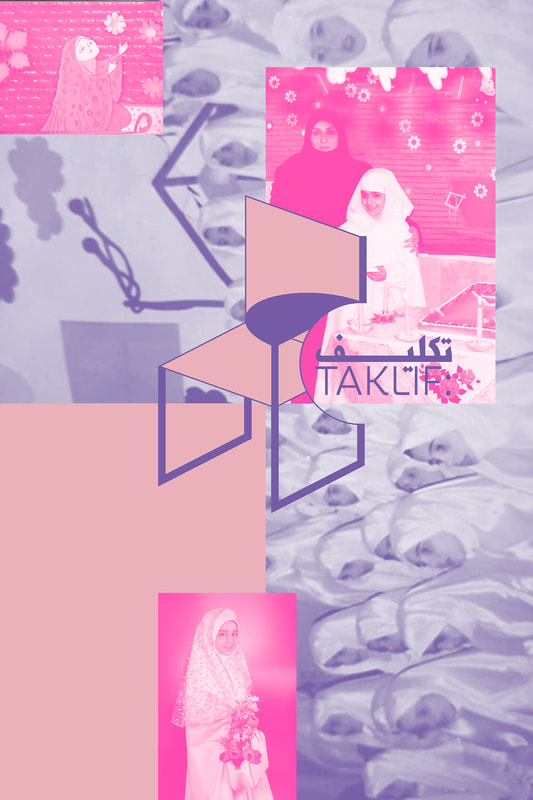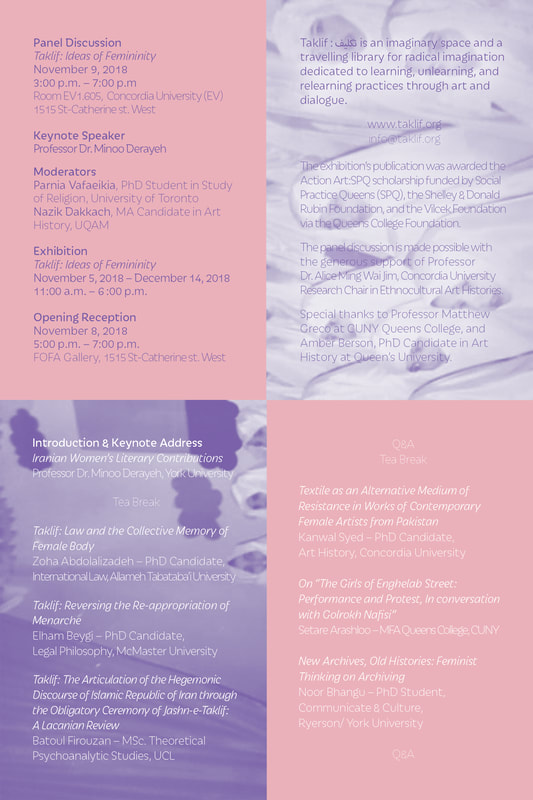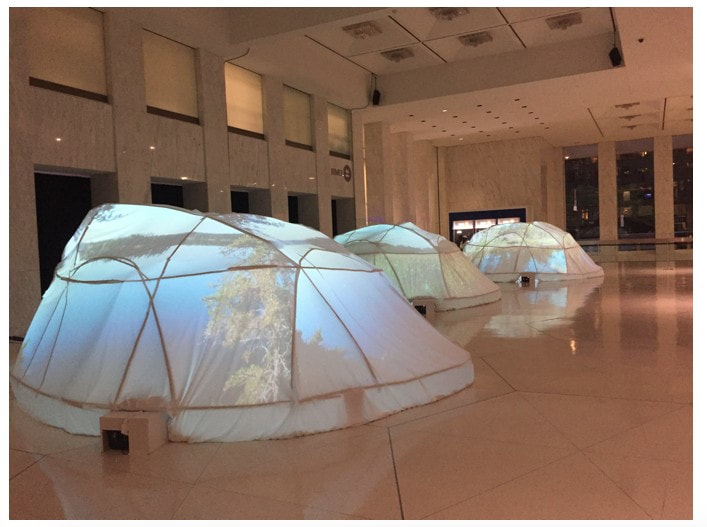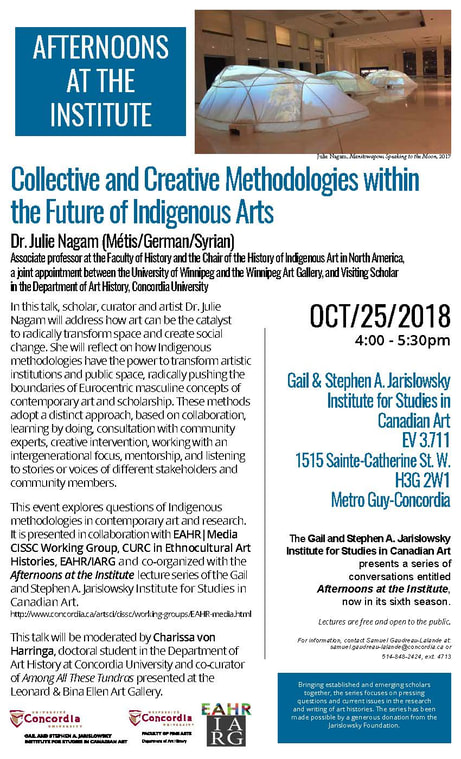|
September 27, 2018 | 6:30-8:00pm Gail and Stephen A. Jarislowsky Institute for Studies in Canadian Art Concordia University, EV 3.711 1455 De Maisonneuve Boulevard West Montreal, Quebec H3G 1M8 Within the context of Canadian art, deep listening as a decolonial practice has been a crucial part of engaging Indigenous thinking and other ways of knowing. Please join us for the inaugural event of the 2018-2019 EAHR | Media program featuring: Rajni Shah Horizon Postdoctoral Fellow, Acts of Listening Lab (Centre for Oral History and Digital Storytelling – Department of Theatre) Listening Gathering: how we come together “A listening atmosphere is not improvised. It is, on the contrary, the product of a strenuous process of conception, growth and devoted attention.” – Gemma Corradi Fiumara, The Other Side of Language: a philosophy of listening Fiumara asks what the world would be like if philosophy embraced listening as wholeheartedly as it does speaking. In this talk, Rajni Shah will explore what performance might have to offer in creating this possibility – not as a topic for discussion or exploration, but by considering the acts of gathering and listening as the central ‘work’ in the idea of an ‘artwork’. We’ll begin by arriving, and paying attention to where we are. We’ll let go of the ideas we were holding on to before the talk began. We’ll acknowledge the land on which we gather. And then, we’ll begin (again). This talk will be followed by a ‘no questions’ session, during which we will collectively experience a reorientation of the usual Q&A format. Everyone is welcome. Rajni Shah is a British/Indian artist whose work leans gently but clearly across disciplines, countries, and thought structures, ranging from intimate encounters with passers-by in public space to large-scale performances in theatres and galleries. Key projects – always created alongside and in collaboration with others – include hold each as we fall (1999), The Awkward Position (2003-4), Mr Quiver (2005-8), small gifts (2006-8), Dinner with America (2007-9), Glorious (2010-12), Experiments in Listening (2014-15), Lying Fallow (2014-15), Song (2016), and Feminist Killjoys Reading Group (2016-ongoing). Rajni was an Artsadmin Associate Artist (2009-2013), an Honorary Research Fellow at The Centre for Contemporary Theatre, Birkbeck College, University of London (2012-2016), and is currently a Horizon Postdoctoral Fellow at Concordia University, affiliated with the Centre for Oral History and Digital Storytelling - Dept. of Theatre. In 2019, Rajni’s first monograph, entitled ‘We are capable of so much more: Experiments in Listening’, will be published as a book and a series of zines within Palgrave’s Performance Philosophy series. For an archive of performance works, please visit: www.rajnishah.com
0 Comments
November 9, 2018 | 3:00 PM – 07:00 PM E.V. 1.605, Concordia University, 1515 Rue Sainte-Catherine O, Montréal, QC H3G 2W1, Canada Link for the Panel: https://taklif.wixsite.com/website www.taklif.org The panel discussion is made possible with the generous support of Professor Dr. Alice Ming Wai Jim, Concordia University Research Chair in Ethnocultural Art Histories.
Taklif: Ideas of Femininity presents an academic panel discussion along with a Jashn-e-Taklif exhibition at Concordia University. This event draws on and highlights non-Western female collectives and will gather diverse areas of knowledge from the fields of law, history, art, psychoanalysis and philosophy. The panel provides a space for the exchange ideas, with the aim of initiating robust steps towards shaping a foundational knowledge that emancipates femalehood from established, constrained, ideological or hegemonic understandings. Thursday, October 25, 2018 | 4:00-5:30pm Gail and Stephen A. Jarislowsky Institute for Studies in Canadian Art Concordia University, EV 3.711 1455 De Maisonneuve Boulevard West Montreal, Quebec H3G 1M8 Julie Nagam, Manitowapow, Speaking to the Moon, 2017 Collective and Creative Methodologies within the Future of Indigenous Arts
Julie Nagam Associate professor at the Faculty of History and the Chair of the History of Indigenous Art in North America, a joint appointment between the University of Winnipeg and the Winnipeg Art Gallery, and Visiting Scholar in the Department of Art History, Concordia University. In this talk, scholar, curator and artist Dr. Julie Nagam will address how art can be the catalyst to radically transform space and create social change. She will reflect on how Indigenous methodologies have the power to transform artistic institutions and public space, radically pushing the boundaries of Eurocentric masculine concepts of contemporary art and scholarship. These methods adopt a distinct approach, based on collaboration, learning by doing, consultation with community experts, creative intervention, working with an intergenerational focus, mentorship, and listening to stories or voices of different stakeholders and community members. This talk will be moderated by Charissa von Harringa, doctoral student in the Department of Art History at Concordia University and co-curator of Among All These Tundras presented at the Leonard & Bina Ellen Art Gallery. Presented in collaboration with EAHR/IARG and co-organized with the Afternoons at the Institute Lecture Series of the Gail and Stephen A. Jarislowsky Institute for Studies in Canadian Art. The Gail and Stephen A. Jarislowsky Institutes for Studies in Canadian Art presents a series of conversations entitled Afternoons at the Institute, now in its sixth season. Bringing established and emerging scholars together, the series focuses on pressing questions and current issues in the research and writing of art histories. The series has been made possible by a generous donation from the Jarislowsky Foundation. This special Afternoon at the Institute is being held in EV-3.711, of the Engineering, Computer Science and Visual Arts Complex, 1515 Ste-Catherine Street West. Metro Guy-Concordia (map). Conversation are free and open to the public. |
ArchivesCategories |
Concordia University is located on unceded Indigenous lands. The Kanien’kehá:ka Nation is recognized as the custodians of the lands and waters on which we gather today. Tiohtiá:ke/Montreal is historically known as a gathering place for many First Nations. Today, it is home to a diverse population of Indigenous and other peoples. We respect the continued connections with the past, present and future in our ongoing relationships with Indigenous and other peoples within the Montreal community.
For more information, please visit: https://www.concordia.ca/about/indigenous/territorial-acknowledgement.html
Credits: EAHR's logo was created and designed by Adrienne Johnson, co-founder of EAHR / notre logo a été créé par Adrienne Johnson, co-fondatrice de EAHR.
Copyright © 2018

